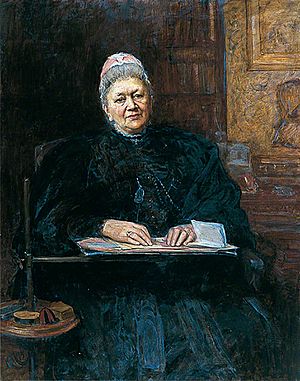Phoebe Lankester facts for kids
Quick facts for kids
Phoebe Lankester
|
|
|---|---|
 |
|
| Born |
Phoebe Pope
10 April 1825 |
| Died | 9 April 1900 (aged 74) |
| Nationality | British |
| Occupation | botanist |
Phoebe Lankester (born Phoebe Pope) was a British botanist. She lived from April 10, 1825, to April 9, 1900. Phoebe was well-known for her popular science writing. She wrote a lot about wildflowers, parasitic plants (plants that live off other plants), and ferns. Her books and articles were special because they mixed scientific facts with easy-to-understand language. This meant both scientists and regular people could enjoy her work.
Her Family Life
Phoebe Pope was born in Highbury, England. Her father used to own a mill in Manchester. She also had one brother.
In 1845, Phoebe married Edwin Lankester. He was a naturalist, which means he studied nature. They had eight children together. Their son, Ray Lankester, later became a famous zoologist. A zoologist is a scientist who studies animals.
Her Amazing Writing
Phoebe Lankester published her books and articles under the name Mrs. Lankester. Her books were very good because they were scientifically correct. But they also included interesting facts about how people traditionally used plants for medicine.
Besides writing books, Phoebe also gave talks about science. She wrote a special newspaper column for women. This column appeared in many local newspapers across the country.
Phoebe Lankester also helped with a very important book. It was called English Botany. She wrote a new part for the third edition in 1884. This section shared popular knowledge about plants. The book was huge and had beautiful pictures. These pictures were drawn by James Sowerby and other artists from the Sowerby family.
Some of Her Books
Phoebe Lankester wrote many books that helped people learn about plants. Here are a few of them:
- A Plain and Easy Account of the British Ferns (1860)
- Wild Flowers Worth Notice (1879)
- Talks About Plants, Or, Early Lessons in Botany (1879)
- The National Thrift Reader (1880)
- British Ferns (1881)
See also
 In Spanish: Phoebe Lankester para niños
In Spanish: Phoebe Lankester para niños
 | Sharif Bey |
 | Hale Woodruff |
 | Richmond Barthé |
 | Purvis Young |

